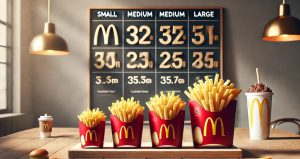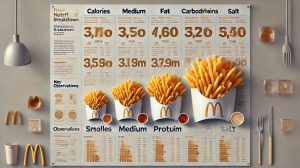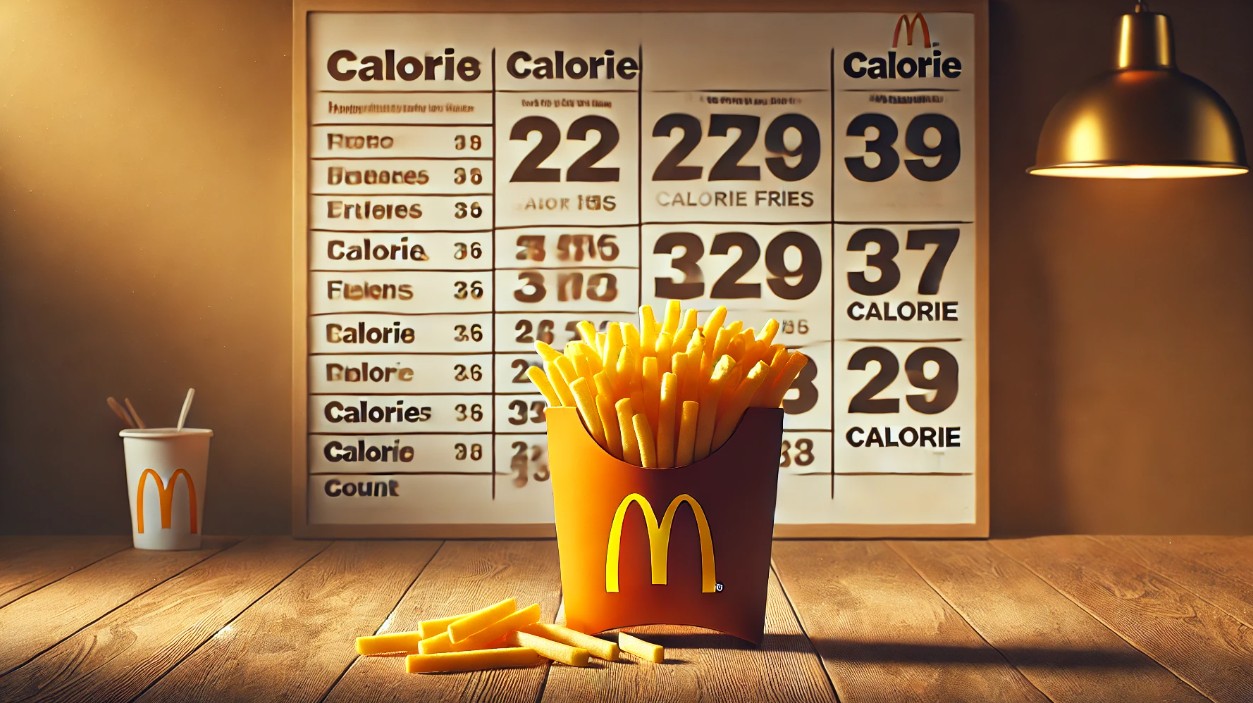Have you ever found yourself reaching for a bag of McDonald’s fries, wondering about their calorie count and nutritional impact?
McDonald’s fries are undeniably one of the most recognisable fast-food items in the world. Known for their golden crispness and signature flavour, they’ve become a staple side dish for millions of customers globally.
But while their taste is universally loved, their nutritional profile often raises questions. How many calories do they contain? How do they fit into your daily diet? And are they really as unhealthy as some might think?
In this detailed blog, we’ll delve into the calorie content of McDonald’s fries across small, medium, and large sizes in the UK. We’ll also explore their nutritional value, how they’re made, and how you can enjoy them while maintaining a balanced lifestyle.
Whether you’re a health-conscious eater or simply curious about your favourite side dish, we’ve got all the answers for you!
McDonald’s Fries Calories: Small, Medium, and Large

McDonald’s fries come in three portion sizes: small, medium, and large, each with varying calorie and nutrient levels. The size you choose can significantly impact your overall meal’s calorie count.
| Serving Size | Calories | Energy (kJ) | Fat (g) | Carbs (g) | Protein (g) | Salt (g) |
| Small Fries | 237 kcal | 990 kJ | 12g | 29g | 2.3g | 0.44g |
| Medium Fries | 337 kcal | 1410 kJ | 17g | 42g | 3.3g | 0.62g |
| Large Fries | 444 kcal | 1855 kJ | 22g | 55g | 4.4g | 0.82g |
Quick Analysis
- Small Fries: Ideal for a light snack or side dish, contributing 12% of an average adult’s daily calorie intake (based on a 2,000-calorie diet).
- Medium Fries: A more filling portion, suitable for a standard meal, with 17% of daily calories.
- Large Fries: Best for a hearty indulgence, making up 22% of daily calories.
Keep in mind that these numbers only reflect the fries themselves, without dips or additional menu items. Adding sauces like mayonnaise or ketchup can increase the calorie and sodium count significantly.
A Closer Look at the Nutritional Value

Nutritional Breakdown by Size
Small Fries (237 kcal)
- Fat: 12g (17% RI)
- Carbohydrates: 29g (11% RI)
- Protein: 2.3g (5% RI)
- Salt: 0.44g (7% RI)
Medium Fries (337 kcal)
- Fat: 17g (24% RI)
- Carbohydrates: 42g (16% RI)
- Protein: 3.3g (7% RI)
- Salt: 0.62g (10% RI)
Large Fries (444 kcal)
- Fat: 22g (31% RI)
- Carbohydrates: 55g (21% RI)
- Protein: 4.4g (9% RI)
- Salt: 0.82g (14% RI)
Key Observations
- Fat Content: The fat content rises significantly with portion size. Large fries contain nearly double the fat of small fries.
- Carbohydrates: McDonald’s fries are a carbohydrate-heavy snack, contributing a quick energy source but with little fibre or sustained nutritional value.
- Sodium: While the salt content remains moderate, excessive consumption could lead to exceeding the daily sodium intake.
How Do McDonald’s Fries Fit into a Balanced Diet?

When eaten occasionally, McDonald’s fries can fit into a balanced diet. However, frequent consumption may lead to exceeding daily limits for fat, sodium, and calories.
Percentage of Recommended Daily Intake (RI)
- A large serving of fries accounts for 22% of the daily calorie RI, making it a substantial part of your daily allowance.
- The fat content in large fries is 31% of the recommended daily intake, which is considerable for a single item.
Balancing Your Meal
- Opt for smaller portion sizes to reduce caloric and fat intake.
- Pair fries with healthier items, such as grilled chicken wraps, salads, or fruit bags.
- Limit high-calorie beverages, such as sugary soft drinks, and choose water or unsweetened options instead.
How McDonald’s Fries Are Made?
The preparation process of McDonald’s fries is one of the reasons behind their consistent taste and quality. In the UK, they are made from high-quality potatoes like Russet Burbank and Shepody varieties.
Ingredients
- Potatoes
- Non-Hydrogenated Vegetable Oils (Rapeseed)
- Dextrose (added at the start of the potato season to maintain colour)
- Salt (added after cooking)
Preparation Process
- Potatoes are peeled, cut, and blanched.
- They are then partially fried and frozen to preserve freshness.
- At the restaurant, the fries are fried to a golden crisp in a vegetable oil blend.
Suitability for Vegetarians
- In the UK, McDonald’s fries are suitable for vegetarians as they are free from animal-based ingredients.
- However, they may be cooked in the same oil as some other products, so cross-contamination is a possibility.
Healthier Choices at McDonald’s
If you’re looking to reduce your calorie intake while enjoying McDonald’s, here are some practical tips:
- Choose Smaller Portions: Opting for small fries instead of large can save you 207 calories, along with lower fat and salt content.
- Pair Wisely: Replace fries with a side salad or fruit bag to reduce calorie and fat intake while adding nutrients to your meal.
- Limit Sauces: High-calorie dips like mayonnaise can add unnecessary calories. Stick to low-calorie options like ketchup or avoid dips altogether.
Are McDonald’s Fries Healthy?

While McDonald’s fries are delicious, they are a high-calorie, high-carb, and high-fat food with limited nutritional value. However, they can be part of a healthy lifestyle when consumed in moderation.
Pros
- Convenient, tasty, and widely loved.
- Provide quick energy through carbohydrates.
- Vegetarian-friendly in the UK.
Cons
- High in fat and sodium.
- Lacks essential vitamins, fibre, and other nutrients.
- Regular consumption can lead to weight gain and health issues.
Conclusion
McDonald’s fries are a classic indulgence, but they should be enjoyed mindfully. With 237 kcal for small fries, 337 kcal for medium fries, and 444 kcal for large fries, they can fit into your diet when consumed occasionally.
Making informed decisions—like choosing smaller portions or pairing them with healthier menu items—can help you enjoy McDonald’s fries guilt-free while staying on track with your health goals.
FAQ Section
How many calories are in McDonald’s large fries?
McDonald’s large fries in the UK contain 444 calories.
Are McDonald’s fries suitable for vegetarians in the UK?
Yes, McDonald’s fries in the UK are vegetarian-friendly, as they are cooked in vegetable oil and do not contain animal-based ingredients.
How much fat is in McDonald’s medium fries?
A medium serving of fries contains 17 grams of fat, which is 24% of the daily recommended intake.
What are the main ingredients in McDonald’s fries?
The main ingredients include potatoes, vegetable oil (rapeseed), dextrose, and salt.
How do McDonald’s fries compare to other fast-food chains?
McDonald’s fries have a similar calorie count to competitors like Burger King (416 kcal) and KFC (465 kcal) for their large sizes.
Can I include McDonald’s fries in a weight-loss plan?
Yes, but portion control is crucial. Opt for smaller sizes and balance them with low-calorie options.




